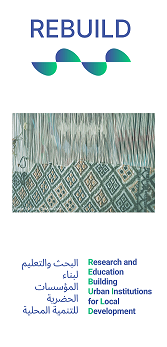What is REBUILD about?
REBUILD is a project in the framework of the Nicosia Initiative, a decentralised cooperation platform active since 2015 between Libyan and European local authorities. It aims at strengthening local public services in Libya through a permanent training mechanism delivered by Libyan universities to Libyan municipalities. More specifically, it contributes to the improvement of the capacity of the 10 partner municipalities to design, implement and evaluate local public policies.
What is the background?
After a long period of strong centralization,in 2011 local governance has been developing all across Libya, reviving new institutions and forming new ones. On July 18, 2012, under increasing public demands for decentralization, the National Transition Council promulgated Law 59, which provided a comprehensive articulation of Libya’s new local administration system.
In 2013, 99 municipalities were established under the guidance of Municipal Councils, the only local elected body that took over many of the responsibilities and duties previously held at a central level (e.g., public health, water and sanitation, public transportation, urban planning). However, the instability of the context and the lack of long-term experience in local administration has made the provision of public services to citizens a great challenge for the municipalities.
Libyan municipalities contacted the European Committee of the Regions in order to address these complex challenges faced in implementing the decentralisation reform: this was the beginning of the Nicosia Initiative, a decentralized cooperation platform active since 2015 between Libyan and European local authorities. This bottom-up initiative is promoted by the European Committee of the Regions with the purpose of supporting Libyan cities to provide public services and play a role within the international community. REBUILD takes place within the framework of the Nicosia Initiative.
One of the pillars of this Initiative is the establishment of a continuous learning mechanism on local development for local administrators of the lIbyan municipalities. Since 2018 the International Cooperation Centre (CCI – Trento) has worked on the continuous learning component of the Nicosia Initiative through training of municipalities and universities.
Starting the REBUILD project, the Autonomous Province of Trento (PAT) decided to take part and continue the process activated in the framework of the Nicosia Initiative to strengthen networks among Local Authorities across the Mediterranean Sea. Thanks to its experience in decentralized cooperation since the early ‘90s and its autonomous status, the PAT intends to activate partnership with Libyan local authorities and in sharing its own experience in handling decentralization processes.
What are the main objectives?
REBUILD intends to:
- support the decentralization process in Libya and to improve the living conditions of the people in Libya;
- contribute to the development of qualitative local public services in Libya;
- strengthen the capacities of Libyan municipalities to design, implement and assess equitable, sustainable, inclusive and resilient local public policies;
- improve the capacities of Libyan municipalities to:
- design, implement and assess equitable, sustainable, inclusive and resilient local public policies
- become a representative and accountable political and administrative reference for the people of their territories;
- setting and testing a sustainable learning framework on local development and local governance.
How will REBUILD proceed to achieve this?
In order to achieve its objectives, REBUILD aims to :
Develop and test a University-based continuous learning system for Lybian Municipalities
This learning system is structured around a training of trainers (TOT) addressing Libyan universities and the subsequent training from Libyan universities to Libyan Municipalities.
The training will focus on experiences and case studies drawn from the activities of EU and MENA local authorities concerning decentralisation processes.
The training set-up will include e-learning activities, in-presence teaching and a regular experiential mentoring in order to closely follow-up and support the civil servants and representatives of the local authorities throughout the overall learning process.
In the first phase the training will focus on reinforcing capacities of the trainers – the lecturers of the 10 Lybian Universities involved – both in terms of contents (around local development) and methodologies (experiential training, blended learning);
With a blended approach, “e-learning” and “in presence training”, the TOT will be implemented on the basis of cycles, each one dealing on a specific topic :
- Promoting sustainable and inclusive development
- Promoting democracy through local governments
- Technical tools for project management
- Leading and managing people
- Promoting social economic development
- Improving performances
- Service delivery (Fishery, Urban planning, Waste management, Health services, E-Government)
In the second phase, after each cycle of training of trainers (ToT), the Universities staff will be delivering the training cycles to the Lybian Municipality civil servants and elected representatives.
Create a network, a community of practices, among Lybian and foreign local authorities in order to promote exchanges of good practices and to share experiences and knowledge through :
- organizing summer schools where participants will take part in intensive capacity building sessions, field visits, exchange of experiences and meetings with local administrators.
- promoting and constantly feeding with inputs the regular exchanges among Lybian Municipalities and Universities and between European and Lybian institutions.
Test the achievements of the capacity building training through two practical pilot projects on the local economic development (fishery) and local public service delivery (waste management). according to the priorities expressed by the Municipalities.
- Pilot project on fishery (managed by the Autonomous Region Friuli Venezia Giulia) in the municipalities of Benghazi, Sirte, Tobruk, Tripoli, Zliten;
- Pilot project on water management (managed by the Autonomous Province of Trento): in the municipalities of Azzawiya, Bani Walid, Gharyan, Sebha, Zintan.

